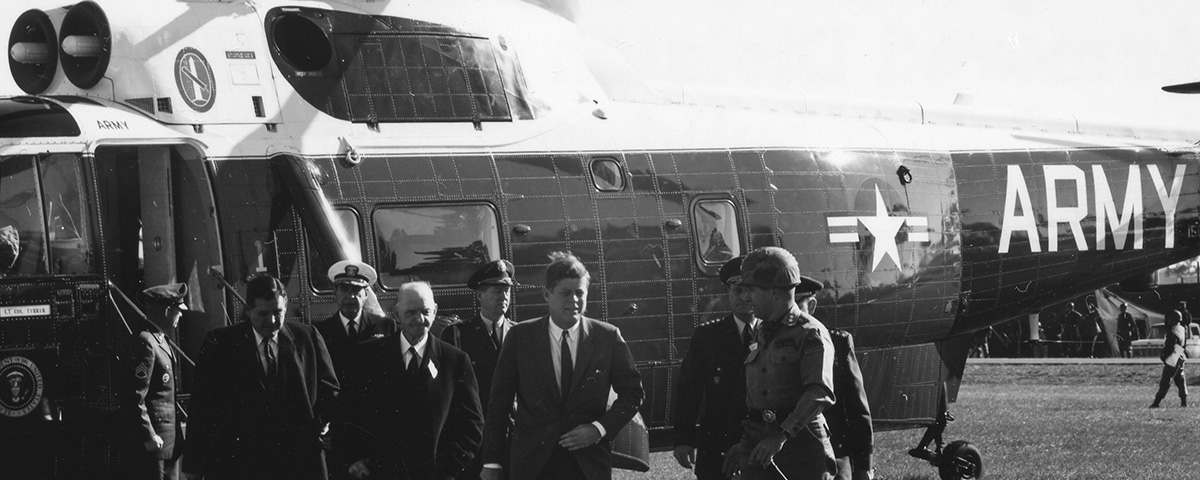IN OUR 1986 book, The Wise Men, about the heyday of the post–World War II WASP (White Anglo-Saxon Protestant) establishment, Walter Isaacson and I described a scene from the first days of the Cuban Missile Crisis. In October 1962, when a CIA spy plane discovered Soviet missiles in Cuba, President John F. Kennedy phoned a retired Wall Street investment banker named Robert Lovett at his home in New York. “Come down at once,” the president commanded. Lovett had been a senior State and Defense Department official during the early years of the Cold War. Kennedy thought so highly of Lovett that at the beginning of his administration he had offered him the choice of three jobs: secretary of state, defense or the treasury. (The 68-year-old had declined, citing ill health.) At the White House Lovett was briefed on the crisis by McGeorge Bundy, the president’s national security adviser. Lovett noticed on Bundy’s desk a photograph of Henry Stimson, Franklin Roosevelt’s secretary of war and a kind of patron saint to Bundy and Lovett. (They had all been in Skull and Bones, the Yale secret society.) Lovett invoked Stimson now: “Mac, I think the best service we can perform for the president is to try to approach this as Colonel Stimson would.”
Bundy instantly agreed. Lovett did not need to spell out what he meant: to approach the problem with the right mixture of stand-up toughness and diplomatic restraint. Stimson, Lovett and Bundy were all charter members of the East Coast foreign policy establishment that quietly, decorously but firmly pushed for a strong American role in the world as avatar and defender of freedom and free markets.
These establishment stalwarts believed that foreign policy should rise above partisan politics. When FDR, a Democrat, appointed Stimson, a Republican, as secretary of war in 1940, Stimson insisted on a truly bipartisan effort and FDR agreed, also naming Henry Knox, a Republican newspaper publisher, as secretary of the Navy. The choice was fine with Stimson; Stimson’s friend Theodore Roosevelt, FDR’s presidential cousin, had once introduced Knox to Stimson with a one-sentence letter: “He’s just our type!”
And what was that type? Men schooled by the Ivy League, often born to wealth, who shared certain assumptions, most admirably the duty to serve. Cui Servire Est Regnare –to Serve is to Rule—is the motto of Groton, one of the prep schools that served as training ground for this elite. Graduates of Harvard, Yale, and Princeton, Groton, Andover (motto: Non Sibi, Not for Thyself) and St. Paul’s, who migrated between Wall Street and Washington in the first half of the 20th Century felt bonds of class, education and attitude that were distinctive. They tended to be hawkish but not belligerent, more attuned to a balance of power than ideology, more practical than dreamily idealistic. They looked down on social snobs and avoided rigid class (or ethnic or religious) bias, but they were more comfortable inside the “Tomb” at Skull and Bones than out on the political hustings. (Bundy and Stimson each ran for public office once and lost badly.)
That American ruling-class type, once described by the columnist Joe Alsop as the “WASP Ascendancy,” has been mostly in decline for the past half-century or so, with occasional brief revivals (the 2004 election between George W. Bush of Andover and Yale and John Kerry of St. Paul’s and Yale guaranteed a Skull and Bones president). Only about one in eight undergrads at Yale today, for example are white male Protestants, and the idea of noblesse oblige seems not just quaint but vaguely repugnant to the meritocrats who now mostly fill the seats at elite schools.
I have seen the transition close up. I graduated from Colonel Stimson’s prep school, Andover, in 1969 and Harvard in 1973, just as the old order was giving way. From 2004 to 2014 I taught journalism and writing at Harvard and Princeton. My students were impressive indeed. They were smarter and harder working than their prep school forbears. But they were wary of going into government—even the students who were ostensibly training to go into government.
Years ago Princeton broadened its motto from “In the Nation’s Service” to add “and in the Service of All Nations.” Students were meant to adopt a generic meaning to public service, to include working for nongovernmental organizations, as well as, say, the State Department. But many students just headed straight for well-paying jobs on Wall Street and in the private sector. The Robertson family, which had generously endowed the Woodrow Wilson School of Public and International Affairs in the early 1960s explicitly to train Foreign Service officers, sued the university, claiming that very few Princeton grads were joining the State Department. The suit was settled after embarrassing publicity.
I often talked to my Princeton students, graduate and undergraduate, about their attitudes toward government service. They were wary and skeptical. They described the federal government in general and the Foreign Service in particular as stultifyingly bureaucratic. They had heard of older peers who had passed the Foreign Service exam and spent the next year waiting to be assigned—only to learn that there were no assignments and that they had to re-apply. To high achievers accustomed to regular affirmation, these stories are highly discouraging. More immediate success—and much greater material reward—await on Wall Street. In the tradition of Bob Lovett and several of the Wise Men of yore, some of these upwardly mobile meritocrats say they plan to enter public life after making their fortunes. There is still precedent: In recent years Goldman Sachs has produced a White House chief of staff, Josh Bolton, and two treasury secretaries, Robert Rubin and Henry Paulson. But modern disclosure and conflict-of-interest rules have made for a tricky and onerous path from private to public life.
Electoral politics seemed even more off-putting to most of my students. Of course, WASP gentlemen themselves were averse to politics in the late 19th century. Theodore Roosevelt stood out from his snobbish peers by plunging into the messy political arena of the New York State Assembly. Some of his brothers in Harvard’s Porcellian Club worried that he would demean himself.
But by the beginning of the 20th century, more and more young men of privilege were going into public service. The model was Elihu Root, a Wall Street lawyer whom Teddy Roosevelt made his secretary of state. Root’s protégé, in turn, was Henry Stimson, and Stimson’s protégés were future Wise Men like Robert Lovett. The string began to run out in the 1960s with McGeorge Bundy and the failure of the “best and brightest” in Vietnam. Government became bigger, more bureaucratic, more accountable but also more unwieldy. When Lovett and Dean Acheson were top State Department officials after World War II, creating the Marshall Plan and the Western Alliance, there was no national security staff in the White House. Policy was made with Harry Truman’s aide Clark Clifford over lunch at the F Street Club.
Jon Meacham has published a magnificent biography of George H.W. Bush that encapsulates vividly the rise and fall of the WASP elite and its faded tradition of noblesse oblige. Bush’s father, Prescott had followed a well-traveled path between Wall Street and Washington, serving as a U.S. senator from Connecticut after profiting as an investment banker at a firm where his partners (and Skull and Bones brothers) included Bob Lovett and Averell Harriman. In East Coast establishment fashion, George Bush served in appointed offices and also campaigned successfully for Congress and as Ronald Reagan’s running mate before reaching the presidency. Sometimes the sons of great men struggle and fail, but two of Bush’s sons went on to be governors, and George W. outdid his father by winning a second term.
It is in George H.W. Bush’s loss to Bill Clinton that we can understand the glory and the pathos of the WASP establishment. In 1988 Bush pandered to the Republican base by vowing, “Read my lips: No new taxes.” In 1991 he had to go back on his word to slow the spiraling federal deficit. That budget deal helped pave the way for a decade of robust economic growth. But it cost him dearly at the polls—as Bush knew it would. By doing the right thing, Bush probably doomed himself politically. Meacham’s biography begins with an introduction titled “The Last Gentleman,” which portrays Bush’s WASP sense of fair play, his humility (notwithstanding his ambition) and his devotion to public service. Today Jeb Bush is struggling as a presidential candidate. He seems uncomfortable on the reality-show stage of modern politics. The Bush era, like the WASP Ascendancy from which it came, may be over. But in some but certainly not all ways, it should be missed.
A bestselling author and historian, Evan Thomas’ latest book is Being Nixon, A Man Divided.
Originally published in the April 2016 issue of American History magazine. Subscribe here.





